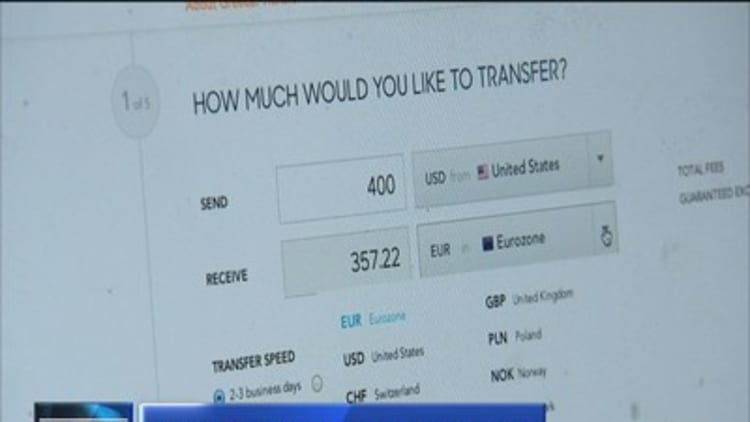Athens will be given a final chance to present a new reform plan to eurozone leaders on Tuesday night despite a hardening attitude to Greece in many capitals after the emphatic rejection of previous bailout terms in Sunday's referendum.
But eurozone officials said leaders were unlikely to agree to restart rescue talks to keep Greece in the currency union at a hastily convened summit in Brussels, despite the Greek overture.
The European Central Bank tightened the screw on cash-starved Greek banks on Monday evening when it required them to stump up more assets in exchange for emergency loans. It did not reveal the scale of its adjustment to the collateral rules, but expects all four of Greece's largest banks to retain access to the loans. It kept the cap on these loans at a total of €89 billion.
The ECB may have to ask eurozone leaders to guarantee Greek government debt for use as collateral to maintain its liquidity lifeline. Greece's banks will remain shut until at least Thursday.

Many officials involved in the talks said there was little willingness to concede on any front, and warned there was not a clear path towards a deal that could avoid a messy default when a €3.5 billion bond owed to the ECB comes due in two weeks.
"Grexit is on everyone's lips, but no one is actually saying it," said one senior official involved in the talks.
Athens did its best to put its political and financial house in order ahead of Tuesday's make-or-break meetings. After making a conciliatory speech on Sunday night, Alexis Tsipras, the prime minister, sacked Yanis Varoufakis, his abrasive finance minister. Mr Varoufakis claimed that other eurozone leaders had demanded his removal.
He was replaced by Euclid Tsakalotos, an Oxford-educated Marxist who is considered more pragmatic than the hardline Mr Varoufakis.
Mr Tsipras also persuaded other Greek political leaders, following seven hours of talks, to back a joint statement that Sunday's rejection of bailout terms was not "a mandate of rupture" with the eurozone.
More from the Financial Times:
A stealthy route to Grexit
Markets prepare for new Greek currency as Grexit prospect grow
ECB should not make a deal harder to reach
Still, eurozone leaders remained skeptical. Valdis Dombrovskis, the European Commission vice-president in charge of eurozone policy, said the No vote "unfortunately widened the gap between Greece and other eurozone countries", and other leaders said that while they would listen to new Greek proposals, the outlook remained bleak.
"In the next couple of days we'll see whether there is sufficient trust and the political opportunity to find a solution," said Jeroen Dijsselbloem, the Dutch finance minister who chairs the committee of his 18 counterparts. "That has to be looked at. It's not so easy to close a door."
Eurozone intransigence was fortified by a calm reaction on financial markets to the referendum result and growing probability of Greece's exit from the euro.
The euro was up 0.05 per cent at $1.1077. Yields on the 10-year German bund edged down just 3 basis points to 0.764 per cent, while peripheral yields rose. Italian 10-year yields were up 14 basis points at 2.39 per cent, and Spanish 10-year yields edged up by 16 basis points to hit 2.37 per cent.
European equities moved with slightly more gusto. The FTSE Eurofirst 300 ended the day down 1.2 per cent, having earlier hit its lowest level since February.
Leaders in many eurozone capitals, particularly Berlin, said they would not be coming to Tuesday's sessions with new compromises and would decide how to proceed only after examining Greece's new offer.
"The preconditions for entering into negotiations over a new aid program do not currently exist," said Steffen Seibert, spokesman for Angela Merkel, the German chancellor.
Read MoreBye, Yanis, hello Euclid. Can this man save Greece?
Eurozone officials said EU lawyers were examining the bloc's treaties to find ways to make a Greek exit from the eurozone legal — even if it meant only a temporary "suspension" from the common currency.
Although eurozone officials said there was diminishing willingness to negotiate with Athens, there were also signs that neither political leaders nor central bankers wanted to be blamed for precipitating "Grexit".
Officials said the ECB, which is faced with triggering Grexit by cutting off emergency loans to Greek banks — forcing Athens to print a new currency if they were to reopen — was insisting the decision was a political choice and would urge eurozone leaders to guarantee the collateral Greek lenders were using to gain access to the central bank lending.
"Everybody knows what the others should do, and do not want to do what the others expect them to do," said one senior eurozone official.
France and, to a lesser degree, Italy have sent more accommodating signals than some of their eurozone counterparts.
On Monday, Matteo Renzi, Italian prime minister, struck a softer tone, saying on Facebook: "Greece [is] a country that is in an extremely difficult economic and social condition. Tomorrow's meeting [of eurozone ministers] will have to show a definitive and permanent solution to this emergency."

